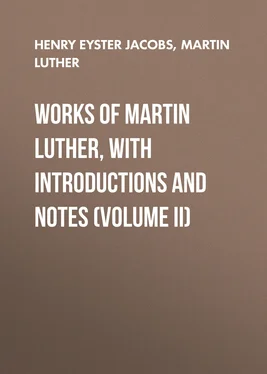Henry Eyster Jacobs - Works of Martin Luther, with Introductions and Notes (Volume II)
Здесь есть возможность читать онлайн «Henry Eyster Jacobs - Works of Martin Luther, with Introductions and Notes (Volume II)» — ознакомительный отрывок электронной книги совершенно бесплатно, а после прочтения отрывка купить полную версию. В некоторых случаях можно слушать аудио, скачать через торрент в формате fb2 и присутствует краткое содержание. Жанр: foreign_prose, foreign_religion, Философия, foreign_psychology, foreign_antique, на немецком языке. Описание произведения, (предисловие) а так же отзывы посетителей доступны на портале библиотеки ЛибКат.
- Название:Works of Martin Luther, with Introductions and Notes (Volume II)
- Автор:
- Жанр:
- Год:неизвестен
- ISBN:нет данных
- Рейтинг книги:3 / 5. Голосов: 1
-
Избранное:Добавить в избранное
- Отзывы:
-
Ваша оценка:
- 60
- 1
- 2
- 3
- 4
- 5
Works of Martin Luther, with Introductions and Notes (Volume II): краткое содержание, описание и аннотация
Предлагаем к чтению аннотацию, описание, краткое содержание или предисловие (зависит от того, что написал сам автор книги «Works of Martin Luther, with Introductions and Notes (Volume II)»). Если вы не нашли необходимую информацию о книге — напишите в комментариях, мы постараемся отыскать её.
Works of Martin Luther, with Introductions and Notes (Volume II) — читать онлайн ознакомительный отрывок
Ниже представлен текст книги, разбитый по страницам. Система сохранения места последней прочитанной страницы, позволяет с удобством читать онлайн бесплатно книгу «Works of Martin Luther, with Introductions and Notes (Volume II)», без необходимости каждый раз заново искать на чём Вы остановились. Поставьте закладку, и сможете в любой момент перейти на страницу, на которой закончили чтение.
Интервал:
Закладка:
Third , There are some benefices which they call incompatibilia 169 169 i. e., Offices which cannot be united in the hands of one man. See e. g., note 3, p. 91.
, and which, according to the ordinances of the canon law, cannot be held by one man at the same time, as for instance, two parishes, two bishoprics and the like. In these cases the Holy Roman See of Avarice evades the canon law by making "glosses," 170 170 A gloss is a note explanatory of a word or passage of doubtful meaning. The glosses are the earliest form of commentary on the Bible. The glosses of the canon law are the more or less authoritative comments of the teachers, and date from the time when the study of the canon law became a part of the theological curriculum. Their aim is chiefly to show how the law applies to practical cases which may arise. The so-called glossa ordinaria had in Luther's time an authority almost equal to that of the corpus juris itself. Cf. Cath. Encyc. , VI, pp. 588 f.
called unio and incorporatio , i. e., by "incorporating" many incompatibilia , so that each becomes a part of every other and all of them together are looked upon as though they were one living. They are then no longer "incompatible," and the holy canon law is satisfied, in that it is no longer binding, except upon those who do not buy these "glosses" 171 171 The thing which was bought was, of course, the dispensation, or permission to avail oneself of the gloss.
from the pope or his datarius 172 172 Dataria is the name for that department of the curia which had to deal with the granting of dispensations and the disposal of benefices. Datarius is the title of the official who presided over this department.
. The unio , i. e., "uniting," is of the same nature. The pope binds many such benefices together like a bundle of sticks, and by virtue of this bond they are all regarded as one benefice. So there is at Rome one courtesan 173 173 See above, p. 88, note 2. For a catalogue of papal appointments bestowed upon two "courtesans," Johannes Zink und Johannes Ingenwinkel, see Schulte, Die Fugger in Rom , I, pp. 282, 291 ff. Between 1513 and 1521, Zink received 56 appointments, and Ingenwinkel received, between 1496 and 1521, no fewer than 106.
who holds, for himself alone, 22 parishes, 7 priories and 44 canonries besides,—all by the help of that masterly "gloss," which holds that this is not illegal. What cardinals and other prelates have, everyone may imagine or himself. In this way the Germans are to have their purses eased and their itch cured.
[Sidenote: Administration]
Another of the "glosses" is the administratio , i. e., a man may have beside his bishopric, an abbacy or a dignity 174 174 See above, p. 87, note 1.
, and possess all the property which goes with it, only he has no other title than that of "administrator." 175 175 So Albrecht of Mainz bore the title of "administrator" of Halberstadt.
For at Rome it is sufficient that words are changed and not the things they stand for; as though I were to teach that a bawdy-house keeper should have the name of "burgomaster's wife," and yet continue to ply her trade. This kind of Roman rule St. Peter foretold when he said, in II Peter ii: "There shall come false teachers, who in covetousness, with feigned words, shall make merchandise of you, to get their gains." [2 Pet. 2:3]
[Sidenote: Regression]
Again, dear Roman Avarice has invented the custom of selling and bestowing livings to such advantage that the seller or disposer retains reversionary rights 176 176 The name of this practice was "regression" ( regressus ).
upon them: to wit, if the incumbent dies, the benefice freely reverts to him who previously sold, bestowed or surrendered it. In this way they have made livings hereditary property, so that henceforth no one can come into possession of them, except the man to whom the seller is willing to dispose of them, or to whom he bequeaths his rights at death. Besides, there are many who transfer to others the mere title to a benefice from which those who get the title derive not a heller of income. It is now an old custom, too, to give another man a benefice and to reserve a certain part out of the annual revenue 177 177 The complaint was made at Worms (1521) that it was impossible for a German to secure a clear title to a benefice at Rome unless he applied for it in the name of an Italian, to whom he was obliged to pay a percentage of the income, a yearly pension, for a fixed sum of money for the use of his name (Wrede, op. cit. , II, 712).
. In olden times this was simony 178 178 Simony —the sin of Simon Magus (Acts 8:18-20)—the sin committed by the sale or the purchase of an office or position which is normally conferred by a ritual act of the Church. In the ancient and earlier mediæval Church the use of money to secure preferment was held to invalidate the title of the guilty party to the position thus secured, and the acceptance of money for such a purpose was an offence punishable by deposition and degradation. The "heresy of Simon" was conceived to be the greatest of all heresies. The traffic in Church offices, which became a flagrant abuse from the time of John XXII (1316-1334), would have been regarded in earlier days as the most atrocious simony.
. Of these things there are so many more that they cannot all be counted. They treat livings more shamefully than the heathen beneath the cross treated the garments of Christ. [Matt. 27:35]
[Sidenote: Reservation in pectore]
Yet all that has hitherto been said is ancient history and an every-day occurrence at Rome. Avarice has devised one thing more, which may, I hope, be his last morsel, and choke him. The pope has a noble little device called pectoralis reservatio , i. e., his "mental reservation," and proprius motus , i. e., the "arbitrary will of his authority." 179 179 The reservatio mentalis or in pectore is the natural consequence of the papal theory that the right of appointment to all Church offices of every grade belongs to the pope (see above, p. 86, note 3). According to the theory of the canonists (Lancelotti, Institutiones juris canonici. Lib. I, Tit. XXVII) this right is exercised either per petitionem alterius , i. e., by confirmation of the election, appointment, etc., of others, or proprio motu , i. e., "on his own motion." In ordinary cases the exercise of the appointing power was limited by rules, which though bitterly complained of (see above, pp. 86 ff, and notes), were generally understood, but the theory allowed any given case to be made an exception to the rules. Of such a case it was said that it was "reserved in the heart of the Pope," and the appointment was then made "on his own motion." Hutten says of this reservatio in pectore that "it is an easy, agile and slippery thing, and bears no comparison to any other form of cheating" (Ed. Booking, IV, 215).
It goes like this. When one man has gotten a benefice at Rome, and the appointment has been regularly signed and sealed, according to custom, and there comes another, who brings money, or has laid the pope under obligation in some other way, of which we will not speak, and desires of the pope the same benefice, then the pope takes it from the first man and gives it to the second 180 180 For a similar instance quoted at Worms (1521), see Wrede, op. cit. , II, 710.
. If it is said that this is unjust, then the Most Holy Father must make some excuse, that he may not be reproved or doing such open violence to the law, and says that in his mind and heart he had reserved that benefice to himself and his own plenary disposal, although he had never before in his whole life either thought or heard of it. Thus he has now found a little "gloss" by which he can, in his own person, lie and deceive, and make a fool and an ape of anybody—all this he does brazenly and openly, and yet he wishes to be the head of Christendom, though with his open lies he lets the Evil Spirit rule him.
Интервал:
Закладка:
Похожие книги на «Works of Martin Luther, with Introductions and Notes (Volume II)»
Представляем Вашему вниманию похожие книги на «Works of Martin Luther, with Introductions and Notes (Volume II)» списком для выбора. Мы отобрали схожую по названию и смыслу литературу в надежде предоставить читателям больше вариантов отыскать новые, интересные, ещё непрочитанные произведения.
Обсуждение, отзывы о книге «Works of Martin Luther, with Introductions and Notes (Volume II)» и просто собственные мнения читателей. Оставьте ваши комментарии, напишите, что Вы думаете о произведении, его смысле или главных героях. Укажите что конкретно понравилось, а что нет, и почему Вы так считаете.












